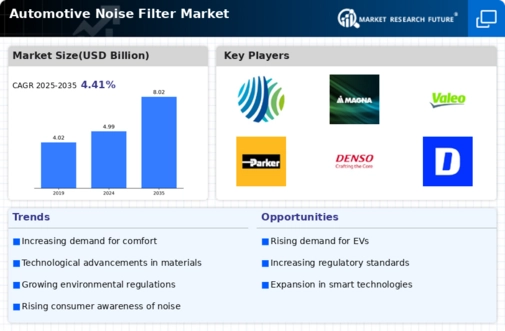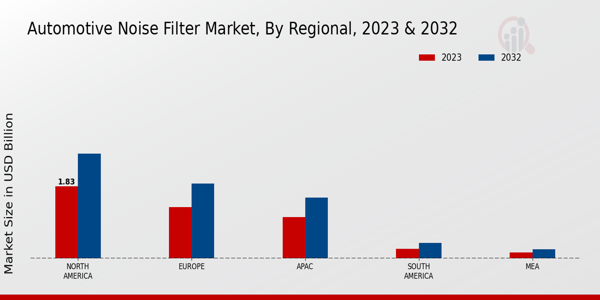Market Growth Projections
The Global Automotive Noise Filter Market Industry is projected to experience substantial growth in the coming years. With a market value of 4.99 USD Billion in 2024, it is expected to reach 8.02 USD Billion by 2035. This growth trajectory indicates a compound annual growth rate (CAGR) of 4.41% from 2025 to 2035. Such projections highlight the increasing importance of noise management in the automotive sector, driven by consumer preferences, regulatory requirements, and technological advancements. The market's expansion reflects a broader trend toward enhancing vehicle comfort and performance, positioning noise filtering as a critical component in modern automotive design.
Growth of Electric Vehicles
The rise of electric vehicles (EVs) is poised to have a profound impact on the Global Automotive Noise Filter Market Industry. Unlike traditional internal combustion engine vehicles, EVs often produce less engine noise, which shifts the focus toward other sources of noise, such as tire and wind noise. This transition creates new opportunities for noise filtering technologies to enhance the overall driving experience. As the global EV market expands, manufacturers are likely to invest in advanced noise reduction solutions to meet consumer expectations for quiet rides. The market is anticipated to reach 8.02 USD Billion by 2035, reflecting the growing importance of noise management in the evolving automotive landscape.
Stringent Noise Regulations
Regulatory bodies across the globe are implementing increasingly stringent noise regulations for vehicles, which is significantly influencing the Global Automotive Noise Filter Market Industry. Governments are recognizing the adverse effects of vehicular noise pollution on public health and the environment. As a result, manufacturers are compelled to adopt advanced noise filtering technologies to comply with these regulations. For instance, the European Union has set ambitious targets for noise reduction in urban areas, prompting automakers to innovate. This regulatory pressure is expected to contribute to the market's growth, as compliance with noise standards becomes a critical factor in vehicle design and production.
Increasing Consumer Demand for Comfort
The Global Automotive Noise Filter Market Industry is experiencing a surge in consumer demand for enhanced comfort within vehicles. As consumers become more discerning about their driving experiences, the need for effective noise reduction technologies has become paramount. This trend is particularly evident in luxury and high-end vehicles, where manufacturers are investing heavily in advanced noise filtering solutions. The market is projected to reach 4.99 USD Billion in 2024, reflecting a growing recognition of the importance of acoustic comfort. This demand is likely to drive innovation and competition among automotive manufacturers, ultimately benefiting consumers with quieter and more enjoyable rides.
Technological Advancements in Noise Filtering
The Global Automotive Noise Filter Market Industry is benefiting from rapid technological advancements in noise filtering solutions. Innovations such as active noise cancellation and advanced soundproofing materials are becoming increasingly prevalent in modern vehicles. These technologies not only enhance the driving experience but also contribute to overall vehicle performance. For example, the integration of smart materials that adapt to varying noise levels is gaining traction. As manufacturers continue to invest in research and development, the market is projected to grow at a CAGR of 4.41% from 2025 to 2035, indicating a robust future for noise filtering technologies in the automotive sector.
Rising Awareness of Health Impacts of Noise Pollution
There is a growing awareness of the health impacts associated with noise pollution, which is influencing the Global Automotive Noise Filter Market Industry. Studies have shown that prolonged exposure to high noise levels can lead to various health issues, including stress and cardiovascular problems. As a result, consumers are increasingly prioritizing vehicles equipped with effective noise filtering technologies. This heightened awareness is prompting manufacturers to enhance their offerings, ensuring that vehicles not only comply with noise regulations but also provide a healthier driving environment. The increasing focus on health and well-being is likely to drive demand for advanced noise reduction solutions in the automotive sector.























